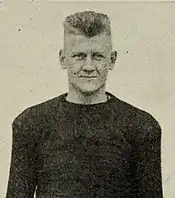Hugh Whelchel
Hugh Calvin "Puss" Whelchel (July 20, 1900 – April 1, 1968) was a college football player.
 Whelchel c. 1921 "Puss" | |
| Georgia Bulldogs – No. 45 | |
|---|---|
| Position | Guard |
| Class | Graduate |
| Career history | |
| College | Georgia (1919–1922) |
| Personal information | |
| Born: | July 20, 1900 Dahlonega, Georgia |
| Died: | April 1, 1968 (aged 67) Sanford, Florida |
| Weight | 200 lb (91 kg) |
| Career highlights and awards | |
| |
Early years
Hugh was born on July 20, 1900 in Dahlonega, Georgia to Henry Cowan Whelchel and Clara Annabel Moore. Hugh was a first cousin of Georgia Tech football player Dan Whelchel.
University of Georgia
He was a prominent guard for the Georgia Bulldogs of the University of Georgia from 1919 to 1922. He was said to have blocked 19 kicks in his college football career.[1] Whelchel was a member of the Alpha Tau Omega fraternity.[2] He was nominated though not selected for an Associated Press All-Time Southeast 1869-1919 era team.[3]
1920
His kick blocking featured in the 21–14 victory over Alabama in 1920.[4] Buck Cheves returned the block 87 yards for a touchdown and the win,[5] ranked fourth in The 50 Greatest Plays In Georgia Bulldogs Football History.[6] Georgia was 8–0–1 and SIAA champions in 1920, as well as the first team known as the "Bulldogs."
1921
He was selected as a third-team All-American by Walter Camp in 1921.
References
- Patrick Garbin (2008). About Them Dawgs!: Georgia Football's Memorable Teams and Players. p. 32. ISBN 9780810860407.
- The Palm. 1921. p. 47.
- "U-T Greats On All-Time Southeast Team". Kingsport Post. July 31, 1969.
- "Whelchel's Blocking Of Kicks Led To Unusual Georgia Win". Reading Eagle. October 16, 1957.
- "Longest Plays" (PDF). Retrieved January 30, 2015.
- Patrick Garbin (August 5, 2008). The 50 Greatest Plays in Georgia Bulldogs Football History.
- "Plans Are Being Finished For Big Celebration Here". Athens Daily Herald. November 15, 1922. p. 1.
- "Camp's All America Stars Show Why They Are Winners; Have Brains, Power, Spirit". Harrisburg Telegraph. December 26, 1922. p. 15. Retrieved March 8, 2015 – via Newspapers.com.
